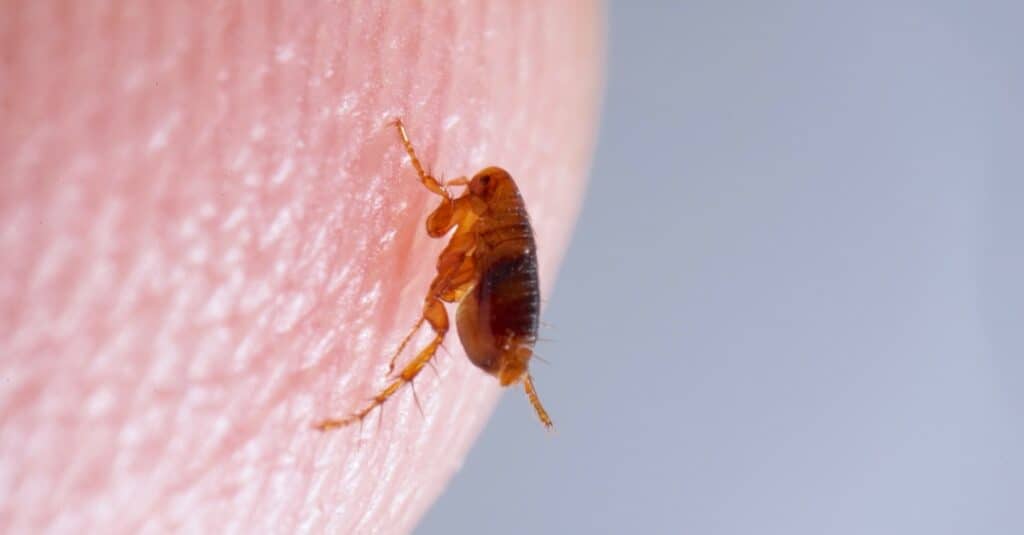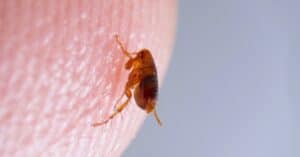Fleas can survive in winter temperatures as low as 46 degrees Fahrenheit. Also, it can take five days of below-freezing conditions for an adult flea to die. Immature fleas (eggs and larvae) are more sensitive to cold than adult fleas and will perish at temperatures of 55.4 degrees Fahrenheit or lower. We will explore how fleas survive in the winter further down below, along with tips to keep your pet safe from them year-round.
Can Fleas Survive During the Winter?

Fleas can survive the winter in humid and warm environments.
©iStock.com/S.Rohrlach
At 75 degrees Fahrenheit, fleas have a fertile environment to complete their life cycle in a matter of weeks. In that period, a single adult flea can produce hundreds of eggs. They can even stay cocooned for as long as 30 weeks, around 50 degrees Fahrenheit. Even though they won’t survive very long during freezing temperatures, they can and will make it year-round with the right conditions and environment. For example, Ctenocephalides Felis, the most frequent flea species, may survive throughout the winter on hosts or in protected locations (carpet, bedding, etc.) if the temperature stays above freezing.
Fleas can survive the winter in humid and warm environments, which can be maintained in areas such as underneath houses, barns, and wildlife dens. This means your pet could get fleas outside in the winter and bring them inside, where they can multiply and thrive. Warmer temperatures in the spring make it possible for flea larvae and pupae to survive, leading to a dramatic increase in the number of adult fleas. Overall, there is never an absolute guarantee that your pet will be flea-free.
Do I Need To Treat My Pet for Fleas in the Winter?

It is essential to select an effective preventative product for fleas.
©Chutima Chaochaiya/Shutterstock.com
It’s especially important to keep your pet protected from fleas in the winter. Avoiding winter flea treatments increases the likelihood of a flea infestation in your house and yard, especially once warmer weather arrives. Flea infestations can be exceedingly costly and difficult to treat. Scratching causes further irritation of the skin and can even lead to infection if there are fleas present.
To prevent fleas from breeding, it is important to keep your pet’s surroundings clean via vacuuming and washing clothing and bedding in hot, soapy water. To truly lessen the possibility of flea infestation on your pet, focus on prevention. Considering this, it is essential to select an effective preventative product. To prevent flea infestations from developing, it is crucial to use flea products all year round due to the high egg production of this pest.
How To Protect Your Pets From Fleas in the Winter
In addition to treating your small dog for fleas, you should also take preventative measures, such as removing dog feces from your yard daily, vacuuming frequently, and caring for your lawn. Keep in mind even after using a suitable medication, fleas and ticks may still be visible on your little dog. This is because it takes the flea medication roughly 24 hours to kill the fleas, and before they die, they become more energetic. It’s possible that you’ll notice newly hatched fleas on your dog’s coat around the same time you treat them. Therefore, long-term treatments are best to kill off any newly hatched fleas as well.
Flea Treatment Options in the Winter

All dogs should be regularly treated for fleas, especially when they have access to outside areas.
©Chutima Chaochaiya/Shutterstock.com
There is a plethora of treatment options for warding off fleas, and they may generally be categorized into three broad types. Among them are topical treatments, shampoos, powders, and more. Let’s explore these further!
Powder, Shampoos, and Spot Treatments
Powders only work for a week, so if you really have the time and inclination, they are a good option. Flea shampoos often only work for about a day. For maximum results, powders and shampoos should be used in conjunction with longer-lasting methods. On the other hand, topical therapies are long-lasting (about a month) and highly efficient. However, not all are created equal. Talk to your vet about the possibility of using a medicine that treats many problems at once (such as fleas and heartworms) to find the best course of action.
Pills
While flea pills are effective, they only kill adult fleas or eggs and can have negative side effects. Flea medications containing an ingredient called isoxazoline have been linked to severe effects like ataxia and seizures, according to a recent NBC News article.
Collar
Flea collars are another option and offer up to eight months of protection. However, they give off a foul odor and are loaded with flea and tick poison; therefore, they shouldn’t be used on pregnant or nursing females or on extremely old dogs or young puppies.
Conclusion
It is important to treat fleas all year round since they thrive in the summer and can survive even the harshest winters. Fleas and ticks can create health problems for humans as well as your canines.
It’s important to keep an eye out for symptoms like itching, skin irritation and redness, and changes in behavior regardless of if you treat your dog year-round. This is because flea pupae can spend months protected inside their cocoon.
The photo featured at the top of this post is © Sahara Frost/Shutterstock.com
Sources
- Small Dog Place, Available here: https://www.smalldogplace.com/fleas-in-winter.html
- PetMD, Available here: https://www.petmd.com/dog/parasites/do-fleas-survive-winter
Thank you for reading! Have some feedback for us? Contact the AZ Animals editorial team.







